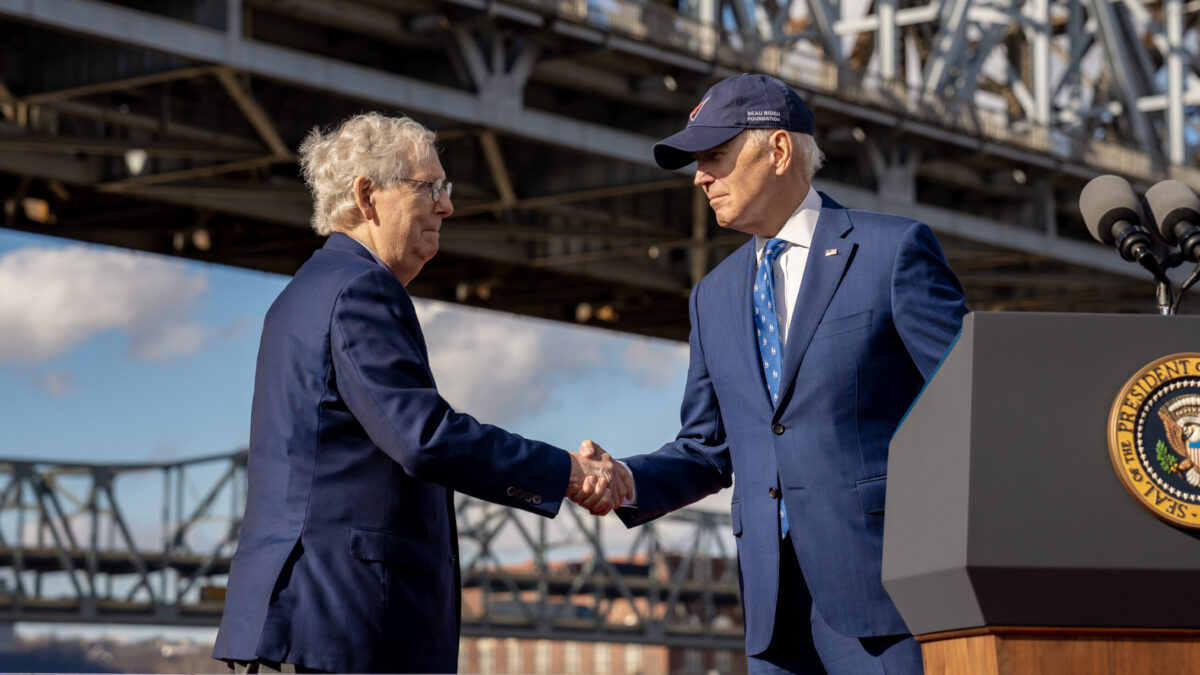Eager to ram through another $95 billion Ukraine spending bill last week, and angry at the base of conservatives who objected, Republican Sens. Thom Tillis and Mitch McConnell went out of their way to trash those “dim” and “short-sighted” Americans.
“Our base cannot possibly know what’s at stake at the level that any well-briefed U.S. senator should know about what’s at stake if Putin wins,” Tillis said last Monday, according to Punchbowl News.
The interventionist Washington establishment says geopolitics is complex, foreign affairs is an intricate web of competing interests, and noninterventionists are provincial and should leave these discussions to the entrenched foreign policy and national security elite in D.C., or at least those who embrace the orthodox perspective on global affairs. Noninterventionism is on the rise, and they don’t like it. In fact, for the first time in recent memory, most Republicans say the United States should stay out of world affairs.
As a former U.S. Army intelligence analyst and an intelligence contractor within the military-industrial complex, I have seen firsthand some of the intricacies involved in the American foreign policy apparatus. One of my major takeaways is an acknowledgment of a vast gap between the inner workings of Washington’s foreign policy machine and the American public’s perception and understanding of these issues.
Many “experts,” both self-described and industry-designated, frame foreign policy as a domain too complex for the average citizen. This gatekeeping mentality, perpetuated by certain policymakers and many experts, implies that international affairs is a high-stakes game played only by those with the right credentials or who adopt the orthodox perspective. This approach not only belittles the public’s capacity to understand global issues but also conveniently sidelines their growing concerns over the United States’ extensive military involvement abroad.
It is all too easy to slide into the comfort and intellectual safety of dismissing the public as unqualified or lacking context. At the breakout of the war in Ukraine, the entire world piled into Twitter spaces and discussed Russian weapon systems, tactics, and the state of the conflict. It was easy to disregard a lot of this as noise, but that was foolish.
The American public is far from uninformed. Open-source intelligence analysts with no apparent industry training have become de facto subject matter experts, with social media accounts providing relatively accurate order of battle information for major conflicts around the world. In fact, there have been substantive analyses posted by these accounts that are both correct and available in a timely fashion.
Yet this increased awareness has not translated into greater involvement or influence over foreign policy decisions. This situation — a well-informed public, with a significant noninterventionist contingent being dismissed by the Washington establishment and corporate media — is creating a disconnect that cannot be ignored.
The disconnect will have profound implications in American politics. The public’s skepticism toward foreign interventions, shaped by the experiences of Iraq and Afghanistan, leaves them skeptical of those in power. Foreign involvement is judged first on whether it will lead to further American entanglement abroad. This divergence is more than a policy disagreement; it’s a fundamental rift in understanding what America’s role in the world should be.
Ignoring this gap is no longer an option. Policymakers must engage in a genuine dialogue with the public, treating them as legitimate stakeholders in the foreign policy process. This doesn’t mean simplifying complex issues, but rather making a concerted effort to explain and justify policy decisions. It’s about bridging the gap between the Beltway and the broader public, ensuring that U.S. foreign policy is effective and democratically legitimate.
Furthermore, policymakers need to recognize the growing demand for a more balanced approach to international affairs, one that prioritizes diplomatic solutions and domestic concerns equally. The real issue is the mismatch between America’s capabilities and its global ambitions. A more focused U.S. foreign policy is increasingly necessary.
By ignoring this need for a focused foreign policy and sidelining the concerns of most Republicans, the Washington establishment is exacerbating a growing divide in the American electorate. We can have a nuanced conversation about America’s role in the world, but we need to participate in good faith. Dismissing over half of all Republicans isn’t the answer.









